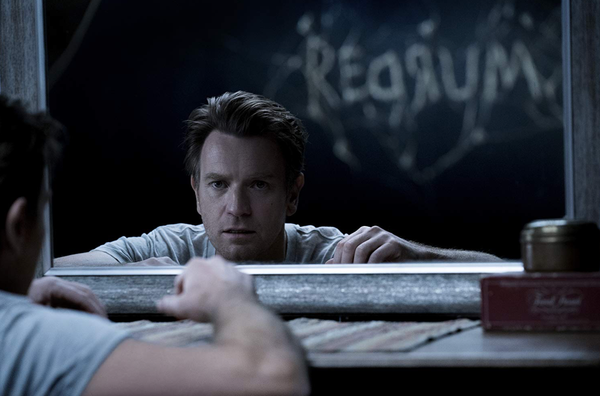Adam Matthews stares into the abyss in his review of Life of Chuck
. Some stories – whether novels, scripts, or otherwise – end up shelved for a million and one reasons. For a writer like Stephen King, who has been treating the work of putting pen to paper with such unyielding tenacity for decades, there are more than a few in his bibliography that could have benefited from a check-in and a rest in one of those drawers. In King’s 2020 novella collection,If It Bleeds
, arguably some of the stories there fit that description like a glove;Life of Chuck
would be a strong case for a narrative that would have delighted in one or two more passes, and its uneven mix of brilliance and clumsiness bleeds directly into Mike Flanagan’s 2024 adaptation of the same name.Act 3: ‘Thanks, Chuck’
Told in reverse, Life of Chuck is structured as three loosely connected acts: a cosmic apocalypse, a metatheatrical musical tribute, and a quiet meditation on memory and death. The film opens with a surreal scenario in Act 3, ‘Thanks, Chuck’: the internet has gone down and society begins to subtly unravel not with violence, but with absurdity: billboards, graffiti, skywriting, all thanking someone named Charles Krantz. It's funny in a strange, anxious way, but also quietly terrifying. There's an unheimlich quality to the world – familiar, yet in the process of being hollowed out – made worse by small uncanny details: monitors in an abandoned hospital frozen on the number 75, ghostly Chuck projections staring from suburban windows like an omniscient Dr. Manhattan figure.
The final image of this act sticks the landing; the beating of his great cosmic heart brings the universe to midnight. Flanagan leans into that tension, turning what could be a tonal mess into something dreamlike. That blend of celestial comedy and melancholia returns in the final act, where the film delivers its most haunting emotional payoff. This bookend act feels in sync, rhyming in tone and texture with the ‘real’ third act, creating a kind of hauntological palimpsest – layers of memory, identity and death bleeding into one another as the final dream of a dying mind.
Act 2: ‘Buskers Forever’
In contrast, ‘Buskers Forever’ doesn’t gel. It’s not just that the tone shifts – it’s that the rhythm stumbles. While the first and third acts feel like two monumental, cohesive structures, this one feels like a townhouse wedged between skyscrapers. The theatricality is inventive – a kinetic jazz and swing dance sequence setting up narration by Nick Offerman that cuts in and out – but emotionally, it’s underdeveloped. The narration overplays its hand, too loyal to King’s prose, and drowns the surreal visuals in exposition. The concept is strong: celebrating a life as if on stage for the cosmos. But the execution feels hollow. Ambitious, yes – but anaemic.
Act 1: ‘I Contain Multitudes’
‘I Contain Multitudes,’ the first chronological act in Life of Chuck (though presented last in the film’s reverse chronology), is where the story finds its emotional core. It’s a quiet, contemplative portrait of childhood and mortality, told through the lens of a young Chuck living with his grandparents in a creaky old house full of ghosts, both literal and metaphorical. Flanagan renders this act with softness and restraint, letting the mundane brush up gently against the metaphysical. Chuck’s grandmother brings vibrant colour and a whimsical tempo to his life, while his grandfather, fading into grey, instils a sense of practicality and grounding. Similarly, Walt Whitman’s ‘Song of Myself’ – “I am large, I contain multitudes” – echoes like a refrain of cosmic inheritance. Their home attic also becomes a space of memory and foreshadowing, where ghosts linger and time blurs. It’s here that the story’s palimpsestic nature comes into full view: overlapping layers of memory, presence, and absence pressing through. The final moments recontextualise all that came before – or after – as the hallucinatory dying thoughts of a man remembering who he was. It’s flawed in King’s original telling, but Flanagan pares it down and sharpens the focus. What was once a meandering novella becomes a melancholic, oddly profound closing note.
Act 0: ‘The Rest of My Meagre Thoughts’
The cast is an uneven ensemble. Tom Hiddleston as Chuck feels strangely miscast – too sleek, too cerebral, not quite grounded in the ‘everyman’ warmth the story seems to want. Mark Hamill is a distinct presence too, leaning into a performance that borders on Wilford Brimley impersonation. Mia Sara delivers a lovely, understated performance, but the noticeable age gap between her and Hamill, playing supposed contemporaries, creates a distracting wrinkle that isn’t addressed and feels off. Chiwetel Ejiofor and Karen Gillan bring gravitas and naturalism, while David Dastmalchian, as always, makes the most of his brief appearance. Yet it is Jacob Tremblay who anchors the emotional arc, embodying young Charles with vulnerability and grace. Tremblay ends up doing the heavy lifting, and Hiddleston can’t quite manage with the little screen time he has.
Visually, the film is gorgeous. Eben Bolter’s cinematography (as profiled in American Cinematographer) captures everything from the cosmic surreal to the heartbreakingly mundane. There is a beautiful sense of light decay and warmth in Act 3, contrasted by the washed-out, clinical feel of the apocalypse. It’s richly textured, never over-stylised. The main theme of Life of Chuck, composed by The Newton Brothers, opens the film with a quietly majestic presence – its gentle piano chords and ambient washes set a tone that’s reflective and metaphysical. The theme underpins key moments, particularly in Act 1, where it gently weaves memory and identity into a cohesive emotional narrative. Meanwhile, the overall soundtrack alternates between jazzy rhythms in the exuberant middle act, richer electronic textures during the apocalyptic sequences, and tender warmth in the final act. This score refrains from bombast; instead, it offers subtle emotional scaffolding to Flanagan’s ethereal structure – supporting without overwhelming, echoing the film’s tonal shifts with nuance and cohesion.
As with all of Mike Flanagan’s work, the film is packed with familiar Flanaganisms: extended philosophical dialogue, thematic hauntings, and his signature playfulness with chronology and structure. These formal risks don’t always land – the pacing still echoes the issues in King’s novella – but they give the film a kind of gentle ambition that’s rare in literary adaptations. One can tell the original story was written by a man in his 60s, but Flanagan avoids the potential anachronism in its authoritative voice; he distils its essence while imbuing it with sharper emotional clarity. He finds a strange beauty in the novella’s messiness, and even when the film doesn’t fully work, it feels personal and felt.
Life of Chuck is uneven, flawed, and structurally risky, yet moving, playful, and oddly profound. It can’t escape the shortcomings of its source, especially pacing issues and moments of cloying sentimentality, but it expands the story’s ambitions, and in some moments, transcends them. Flanagan has made something personal and poetic from one of King’s more undercooked ideas. The result is not for everyone, but for those willing to surrender to its cosmic schmaltz, the reward may be surprisingly moving.
Life of Chuck is in cinemas 20th August 2025.


